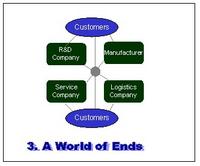| The Future of Business | 2004-01-15 11:14 3 comments |
 by Flemming Funch by Flemming FunchDave Pollard has a nice piece on The Future of Business. Let's step back now from the perspective of the knowledge worker and look at how the business environment for corporations has changed in 2015. In the early 2000s, large corporations that were once hierarchical end-to-end business enterprises began shedding everything that was not deemed ‘core competency’, in some cases to the point where the only things left were business acumen, market knowledge, experience, decision-making ability, brand name, and aggregation skills. This 'hollowing out' allowed multinationals to achieve enormous leverage and margin. It also made them enormously vulnerable and potentially dispensable.Various forward-looking management gurus, like Tom Peters have been talking about this kind of change in the business and job world for a while. Everything will become more loosely connected and changing faster. No lifetime position in a stable company. Everybody will need to be able to market themselves, and will be likely to work on a succession of projects in the form of virtual companies that come together ad hoc to deal with a certain opportunity and that might well disband right afterwards. The change goes all the way up and down. Everybody has to think like an entrepreneur, constantly learning and looking for new opportunities. Constantly working their network, keeping up their repuation. - Your networks are critical: Your success will depend on who you know, but not necessarily who you know well. Because of a phenomenon known as 'the strength of weak links', your future employer, employees, customers and business partners are all likely to be two or three degrees of separation away from those you know personally. Who your associates know is probably more important, therefore, than who you know directly.All of it is of course both scary and exciting. And there are other possibilities of course, but this is quite likely how the capitalistic society is evolving. So, unless something fundamental changes, we'll all have to pay attention. If you'll keep thinking like a good employee you'll be more likely to be expendable and unemployed. If you think like a business person, and you get together a package of goods that the world actually needs - it might all be great. You might have as much chance of succeeding as any multinational company. |